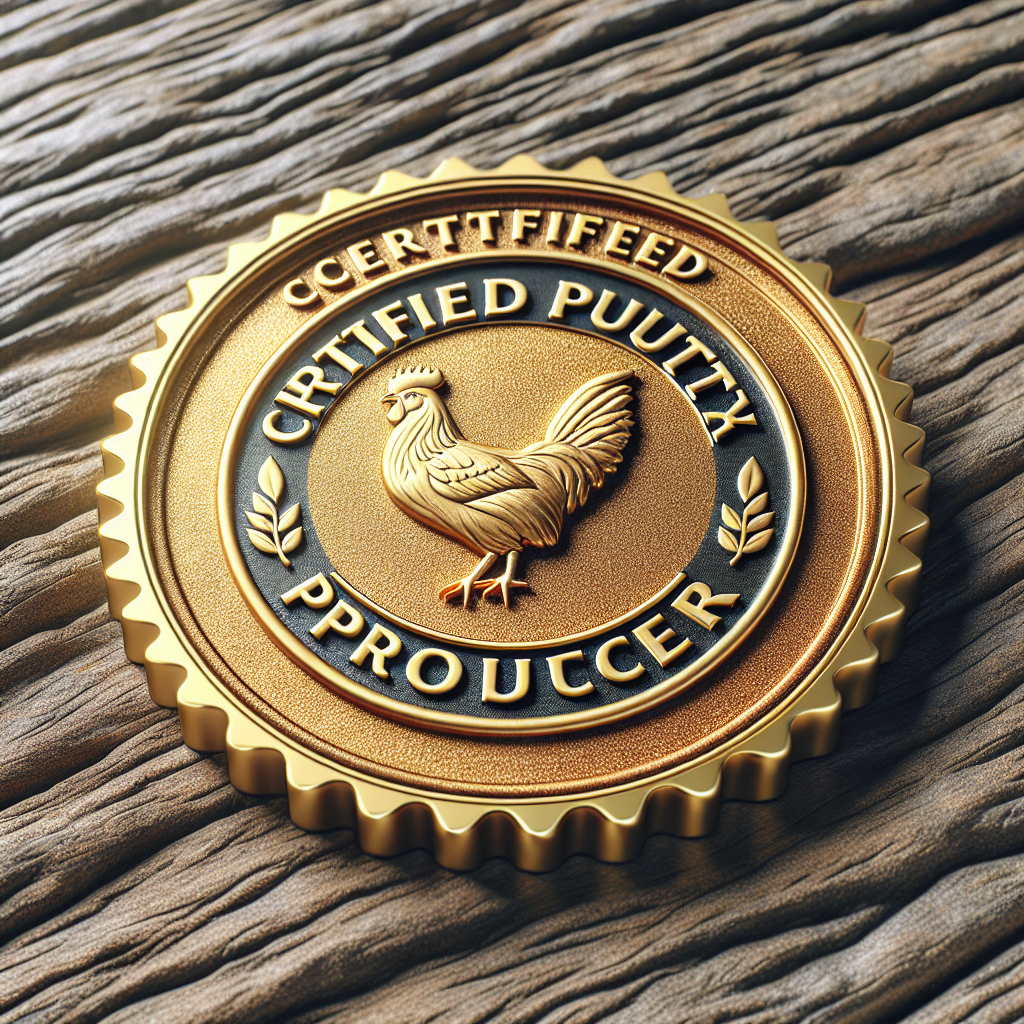Are you a budding chicken farmer who is feeling overwhelmed by the complex regulations surrounding your new venture? Well, fret not, because help is at hand! In this article, we will explore some valuable resources that can assist you in understanding and navigating the regulatory landscape of chicken farming. From online guides to government websites, these resources will provide you with the knowledge and guidance you need to ensure compliance and success in your chicken farming journey. So, let’s get started and demystify the world of regulations in the poultry industry!
Government Agencies and Organizations
United States Department of Agriculture (USDA)
The USDA is a federal agency responsible for overseeing various aspects of agriculture, including chicken farming. They provide resources and regulations to ensure the safety and well-being of chickens, as well as the consumers of chicken products. The USDA offers guidance on topics such as animal health, food safety, and environmental protection. They have a dedicated division, the Animal and Plant Health Inspection Service (APHIS), that focuses on animal health and welfare. The USDA’s website is a valuable resource for finding information on regulations, guidelines, and best practices for chicken farming.
Environmental Protection Agency (EPA)
The EPA plays a crucial role in regulating the environmental impact of chicken farming. They develop and enforce regulations related to water quality, air emissions, and waste management in the poultry industry. The EPA’s website provides information on regulations specific to chicken farming, as well as resources to help farmers comply with environmental regulations. They also offer programs and initiatives aimed at promoting sustainable practices in agriculture, which can be beneficial for chicken farmers who want to reduce their environmental footprint.
Food and Drug Administration (FDA)
The FDA is responsible for ensuring the safety of chicken products intended for human consumption. They regulate various aspects of chicken farming, such as the use of antibiotics and other medications, food labeling, and the prevention of foodborne illnesses. The FDA’s website provides guidance documents, regulations, and resources for chicken farmers to adhere to in order to meet food safety standards. They also collaborate with the USDA to promote the safe and proper handling of chickens throughout the entire food production process.
Department of Labor (DOL)
The DOL oversees labor laws and regulations that apply to chicken farming operations. They provide assistance and guidance on topics such as minimum wage, worker safety, and employment practices. The DOL’s website offers resources and tools to help farmers understand and comply with labor regulations specific to the agriculture industry. Understanding the rights and responsibilities of both farmers and their employees is crucial for maintaining a fair and safe working environment on chicken farms.
National Chicken Council (NCC)
The NCC is a trade association that represents the interests of the chicken industry in the United States. They work closely with government agencies, policymakers, and other stakeholders to advocate for policies and regulations that benefit chicken farmers. The NCC’s website serves as a valuable resource for chicken farmers, providing industry news, research, and information on best practices. They also offer educational programs and events to promote knowledge sharing and networking within the chicken farming community.
Industry Publications
Poultry World
Poultry World is a leading publication covering various aspects of the poultry industry, including chicken farming. They provide up-to-date information on industry news, trends, and technological advancements. Poultry World features articles written by industry experts, offering insights and advice on topics such as animal welfare, biosecurity, and farm management. Subscribing to Poultry World can keep you informed about the latest developments in the chicken farming industry and help you stay ahead of the curve.
The Poultry Site
The Poultry Site is an online platform that serves as a comprehensive resource for poultry professionals, including chicken farmers. They offer a wide range of articles, research papers, and reports on topics such as nutrition, breeding, and disease prevention. The Poultry Site also provides expert advice and guidance on issues specific to chicken farming, making it a valuable source of information for both new and experienced farmers. Additionally, their interactive forums allow you to connect with other chicken farmers and industry experts to exchange knowledge and experiences.
World Poultry
World Poultry is a global publication focusing on all aspects of the poultry industry, including chicken farming. They cover topics such as production systems, market trends, and technological innovations. World Poultry provides in-depth articles and case studies on different aspects of chicken farming, offering valuable insights and practical advice. Subscribing to World Poultry can broaden your understanding of the global chicken farming landscape and help you stay informed about international trends and best practices.
Poultry Times
Poultry Times is a regional publication that caters to the poultry industry in the United States. They provide news, features, and industry updates specific to various regions across the country. Poultry Times covers topics such as disease outbreaks, market analysis, and farm management strategies. Subscribing to Poultry Times can help you stay updated on local regulations, market conditions, and relevant events in your specific area. Their articles also offer insights from local experts, providing valuable perspectives for chicken farmers operating in specific regions.
Academic Institutions
University of Kentucky College of Agriculture, Food and Environment
The University of Kentucky College of Agriculture, Food and Environment offers educational programs and resources for aspiring and seasoned chicken farmers. They have a department dedicated to animal sciences, which covers topics relevant to poultry production and management. The university conducts research on various aspects of chicken farming, including nutrition, health management, and genetics. They also offer extension services that provide practical training and workshops for farmers. The University of Kentucky’s resources can help you gain a deeper understanding of the scientific and technical aspects of chicken farming.
Purdue University Department of Animal Sciences
Purdue University’s Department of Animal Sciences offers a range of programs and resources for chicken farmers. They conduct research on poultry nutrition, behavior, and welfare, translating their findings into practical applications. Purdue’s Cooperative Extension Service provides training and assistance to farmers, covering topics such as flock management, biosecurity, and disease prevention. Their extension educators and specialists can provide personalized guidance to help you navigate the challenges of chicken farming effectively.
Texas A&M University Department of Poultry Science
The Texas A&M University Department of Poultry Science offers educational programs and resources to support the poultry industry, including chicken farming. They provide training on various aspects of poultry production, including nutrition, management, and disease control. Texas A&M University conducts research on emerging issues in the poultry industry and offers extension programs to disseminate that knowledge to farmers. Their expertise in poultry science can help you optimize your farming practices and stay updated on the latest advancements in the field.
Online Forums and Discussion Boards
Backyard Chickens
Backyard Chickens is an online community and discussion forum for chicken enthusiasts, including backyard chicken farmers. This platform allows you to connect with a community of like-minded individuals who share their experiences, tips, and advice on various aspects of chicken farming. Backyard Chickens covers topics such as coop construction, breed selection, and health management. Engaging with this forum can provide you with practical insights and solutions to common challenges faced by backyard chicken farmers.
The Farm Forum
The Farm Forum is an online discussion board covering various aspects of farming, including poultry farming. It provides a space for farmers to share their knowledge, ask questions, and discuss relevant issues. The Farm Forum features dedicated sections for poultry farming, where you can find discussions on topics such as feed formulation, biosecurity practices, and equipment recommendations. Participating in this forum can help you learn from the experiences of other farmers and gain different perspectives on chicken farming.
Homesteading Today
Homesteading Today is an online platform that serves as a community for individuals interested in self-sufficiency and sustainable living, including chicken farming. The platform features forums where you can connect with other homesteaders and discuss various topics related to chicken farming. Homesteading Today covers areas such as coop designs, chicken health, and breed selection. Engaging with this community can provide you with practical guidance, support, and inspiration as you navigate the world of chicken farming.
Professional Networks and Associations
United States Poultry and Egg Association (USPOULTRY)
The USPOULTRY is an industry association that represents the interests of the poultry and egg industry in the United States. They provide resources, advocacy, and educational programs to support the growth and success of their members, including chicken farmers. The USPOULTRY conducts research, develops guidelines, and offers training on various topics related to poultry production, animal health, and food safety. Becoming a member of the USPOULTRY can connect you with a community of professionals and provide access to valuable industry knowledge and networking opportunities.
American Veterinary Medical Association (AVMA)
The AVMA is a professional association representing veterinarians across various disciplines, including poultry health and welfare. They provide resources and guidelines related to poultry care, disease prevention, and biosecurity. The AVMA’s resources can help you ensure the well-being of your chickens and develop effective health management strategies. They also offer continuing education programs and events that focus on poultry medicine and husbandry. Engaging with the AVMA can provide you with the latest information and best practices in poultry health and welfare.
American Association of Avian Pathologists (AAAP)
The AAAP is a professional association dedicated to advancing the field of avian pathology, including poultry health. They provide resources, education, and networking opportunities for veterinary professionals and researchers in the poultry industry. The AAAP publishes scientific journals and organizes conferences and symposiums focused on avian pathology and poultry health. Engaging with the AAAP can help you stay updated on the latest research and advancements in poultry disease prevention and management.
Government Regulations and Guidelines
Animal Welfare Act (AWA)
The Animal Welfare Act is a federal law that sets standards for the humane care and treatment of animals, including those used in research, exhibition, and agriculture. The AWA covers various aspects of animal welfare, such as housing, veterinary care, and transportation. Familiarizing yourself with the requirements of the AWA can help you ensure the welfare of your chickens and remain compliant with federal regulations.
Clean Water Act (CWA)
The Clean Water Act is a federal law that regulates the discharge of pollutants into U.S. waters, including those generated by livestock operations. It sets guidelines and requirements for managing animal waste and preventing water pollution. Understanding the provisions of the CWA can help you implement practices to minimize the environmental impact of your chicken farming operations and comply with water quality regulations.
Occupational Safety and Health Act (OSHAct)
The Occupational Safety and Health Act is a federal law that promotes safe and healthy working conditions in the United States. It sets standards for workplace safety and requires employers to provide a hazard-free environment for their employees. Understanding the provisions of the OSHAct is crucial for ensuring a safe working environment on your chicken farm and complying with occupational safety regulations.
Federal Food, Drug, and Cosmetic Act (FD&C Act)
The Federal Food, Drug, and Cosmetic Act is a federal law that regulates the safety and labeling of food, drugs, and cosmetics in the United States. It applies to chicken products intended for human consumption. Familiarizing yourself with the requirements of the FD&C Act can help you ensure that your chicken products meet safety standards and comply with labeling requirements.
Online Courses and Training Programs
Coursera – Introduction to Animal Farming and Welfare
Coursera offers an online course titled “Introduction to Animal Farming and Welfare” that covers various aspects of animal farming, including poultry farming. This course provides an overview of animal welfare practices, ethical considerations, and the impact of farming on the environment. Taking this course can help you gain a broader understanding of the challenges and responsibilities associated with chicken farming, as well as strategies for implementing sustainable and humane practices.
Udemy – Poultry Farm Management: Disease Prevention, Health, and Biosecurity
Udemy offers an online course specifically focused on poultry farm management, disease prevention, health, and biosecurity. This course covers topics such as biosecurity protocols, disease identification and prevention, and effective farm management practices. Taking this course can equip you with the knowledge and skills necessary to protect the health of your flock and optimize the productivity of your chicken farm.
Penn State Extension – Raising Broilers and Turkeys
Penn State Extension offers a comprehensive online course on raising broilers and turkeys. This course covers topics such as breed selection, housing and ventilation, nutrition, and flock management. By taking this course, you can learn the best practices for raising healthy and productive broilers and turkeys, enhancing your skills and knowledge as a chicken farmer.
Agricultural Extension Services
USDA National Institute of Food and Agriculture (NIFA)
The USDA NIFA is an agency that provides funding, research, and educational resources to support agricultural practices. They offer programs and grants that focus on animal agriculture and can assist chicken farmers in accessing resources and technical assistance. The USDA NIFA’s website provides information on funding opportunities, research findings, and extension resources relevant to chicken farming.
Cooperative Extension System
The Cooperative Extension System is a nationwide network of agricultural extension offices affiliated with land-grant universities. These extension offices offer educational programs, workshops, and one-on-one consultations to farmers, including chicken farmers. They provide resources and expertise on various aspects of chicken farming, such as nutrition, housing, disease management, and business planning. Contacting your local Cooperative Extension office can connect you with knowledgeable extension agents who can help answer your questions and provide tailored guidance for your specific farming needs.
Research Papers and Publications
Journal of Applied Poultry Research
The Journal of Applied Poultry Research is a peer-reviewed publication that publishes original research and reviews related to poultry science and production. This journal covers a wide range of topics, including nutrition, genetics, management, and disease prevention. Reading articles from the Journal of Applied Poultry Research can provide you with insights into the latest research findings and advancements in the field of chicken farming.
Poultry Science
Poultry Science is a leading scientific journal that publishes research articles, reviews, and technical notes on all aspects of poultry science. This journal covers areas such as genetics, nutrition, management, and welfare. Keeping up with the articles published in Poultry Science can keep you informed about the latest scientific findings and emerging trends in chicken farming.
The Veterinary Journal
The Veterinary Journal is a respected publication that covers various aspects of veterinary medicine, including those relevant to poultry health. This journal publishes research articles, case reports, and reviews that focus on poultry diseases, diagnostics, and treatment. Reading articles from The Veterinary Journal can provide you with valuable insights into poultry health management and the latest advancements in avian veterinary medicine.
In-person Training and Workshops
National Poultry Improvement Plan (NPIP) Training
The National Poultry Improvement Plan offers in-person training programs for chicken farmers participating in the plan. These training sessions cover topics such as disease monitoring, testing, and biosecurity measures. Attending NPIP training can help you understand and implement best practices for disease prevention and management, enhancing the health and productivity of your flock.
Biosecurity Workshops
Biosecurity workshops are often organized by government agencies, universities, and industry associations. These workshops focus on educating farmers on biosecurity measures to prevent the spread of diseases on their farms. Attending biosecurity workshops can improve your understanding of biosecurity protocols and provide you with practical tools and strategies to protect your chickens from potential diseases.
In conclusion, there are numerous resources available to assist you in understanding and navigating the regulatory landscape of chicken farming. Government agencies and organizations like the USDA, EPA, FDA, and NCC provide regulations, guidelines, and support to ensure the safe and sustainable production of chickens. Industry publications such as Poultry World, The Poultry Site, World Poultry, and Poultry Times offer insights, news, and best practices from reputable sources in the poultry industry. Academic institutions like the University of Kentucky, Purdue University, and Texas A&M University provide educational programs, research, and extension services to help chicken farmers improve their knowledge and skills. Online forums and discussion boards such as Backyard Chickens, The Farm Forum, and Homesteading Today offer a platform for chicken farmers to connect, share experiences, and seek advice from fellow farmers. Professional networks and associations like USPOULTRY, AVMA, and AAAP provide resources, advocacy, and networking opportunities to support chicken farmers in their professional journey. Government regulations and guidelines, such as the AWA, CWA, OSHAct, and FD&C Act, set standards and requirements that chicken farmers must adhere to ensure the welfare of their chickens, protect the environment, and produce safe and quality products. Online courses and training programs offered by platforms like Coursera, Udemy, and Penn State Extension provide in-depth education on various aspects of chicken farming, further enhancing your skills and knowledge. Agricultural extension services like USDA NIFA and Cooperative Extension offices offer resources, funding opportunities, and technical assistance to support chicken farmers. Research papers and publications like the Journal of Applied Poultry Research, Poultry Science, and The Veterinary Journal provide access to the latest scientific findings and advancements in the field of chicken farming. In-person training and workshops such as the NPIP training and biosecurity workshops provide hands-on learning experiences and practical tools to manage diseases and ensure the biosecurity of your farm. By utilizing these diverse resources, you can gain a comprehensive understanding of the regulatory landscape of chicken farming and enhance your success as a chicken farmer.




